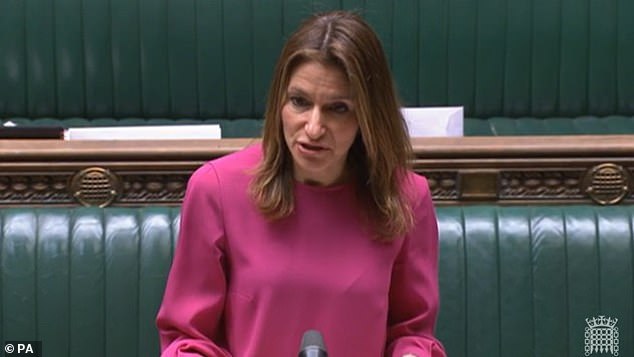Young adults face tighter restrictions on betting under new plans to bring gambling laws ‘into the digital age’.
Culture Secretary Lucy Frazer said tougher gambling regulations were needed to reflect the shift of the industry online, which has left people with a ‘virtual mobile casino in their pockets’.
The plans include a new mandatory levy on the betting industry which is expected to raise more than £100million a year to fund services for recovering addicts, including NHS clinics.
Gambling firms will be required to carry out ‘affordability checks’ on those who lose more than £500 in a year and more extensive checks on anyone who loses more than £1,000 in a day or £2,000 over three months.
Tougher restrictions are also being proposed for under-25s, raising fears ministers are creating a ‘dividing line’ in society.

The plans include a new mandatory levy on the betting industry which is expected to raise more than £100million a year to fund services for recovering addicts (file image of a man using an online betting app)

Culture Secretary Lucy Frazer said the reforms would bring gambling legislation into the smartphone age
Under-25s could see their bets on online casino games capped at £2 while older punters may be allowed to bet £15 a time. The threshold for affordability checks for under-25s will be set at half the level for older adults. And betting shops will be asked to demand proof of age from customers who look to be under 25.
The gambling White Paper cited research suggesting younger people are more prone to gambling addiction.
The document read: ‘Evidence suggests adolescents have a greater risk tolerance compared to older adults and this may be reflected in their attitudes towards gambling.’
Young adults were also deemed to be more susceptible to ‘peer pressure’ to gamble.
Gambling minister Stuart Andrew said: ‘We are not stopping the under-25s from gambling, just ensuring they have greater protections.’
But the move has caused disquiet in parts of government, with some ministers nervous about imposing ‘nanny state’ restrictions on younger adults.
Tory MP Philip Davies said: ‘We have had a settled view in this country for a long time that people become adults at 18.
‘Why are we now infantilising young adults? It is really quite patronising.’
The review of gambling laws was launched in 2020 and campaigners warned proposed consultations on yesterday’s measures will lead to further delays.
Labour MP Carolyn Harris, chairman of parliament’s all-party group on gambling harm, welcomed the proposals but warned: ‘We do not need more consultation – we have had two-and-a-half years since the review. We need swift action, immediate implementation of the proposals and urgent legislative change where necessary.’
Mr Andrew said consultation was needed to limit the risk of legal action and insisted the measures would be brought in by the summer of next year.
MPs also voiced concerns over the lack of action to clamp down on gambling advertising.
Earlier this month, Premier League clubs agreed to stop carrying betting sponsors on the front of players’ shirts. A proposed code of conduct could also remove gambling ads from family enclosures at stadiums.
Labour MP Paul Blomfield warned a ‘shocking number of children’ are being sucked into gambling addiction and ‘for many, football is the hook’.
Everyone should have a flutter if they like, but punters must be protected, says Culture Secretary LUCY FRAZER
The Daily Mail has helped shine the brightest possible spotlight on the catastrophic consequences gambling can have when the occasional bet becomes a ruinous addiction.
As has been documented so powerfully in the pages of this paper, the damage caused by unchecked addiction often goes far beyond just financial losses. It can lead vulnerable people down a path to broken marriages, the loss of house and home and, in the worst cases, suicide.
The reforms outlined yesterday will bring our outdated gambling laws into the smartphone age.
But while these reforms are necessary, we should not lose sight of the fact that the overwhelming majority of people who gamble in this country do so safely.
Sport and betting have been indivisible for centuries; kings and queens have always enjoyed trips to the races, and the film My Fair Lady famously revels in its depiction of Eliza Doolittle attending her first ever races. We have no intention of coming between people and a bet on the Derby or the National or the odd Saturday accumulator.

The film My Fair Lady famously revels in its depiction of Eliza Doolittle (Audrey Hepburn, pictured) attending her first ever races

Runners and riders taking part in the Coral Scottish Grand National last weekend. Sport and betting have been indivisible for centuries; kings and queens have always enjoyed trips to the races, says Lucy Frazer
Today gambling companies make a huge contribution not just to our economy, but our jobs market. They employ thousands in all parts of the country and bring millions into our Exchequer. This British economic success story should never be overlooked.
But policymakers tasked with setting gambling laws in 2005 could never have foreseen the breakneck speed of innovation and change that would transform gambling in the decade that followed.
We have gone from chunky Nokia phones to smartphones hosting super casinos in our pockets. For problem gamblers, access is ever-present and only ever a tap away.
Thousands find the constant draw, combined with an avalanche of offers, an irresistible pull. And that is the reason the problem gambling rate for online casinos is nearly 20 times higher than the overall rate.
Some companies today are simply not doing enough to protect punters. The Gambling Commission has issued record fines and undertaken record levels of enforcement in the past year. That does not happen by accident.
It is our job, and the job of any responsible government, to ensure our laws are not only keeping pace with technological revolutions but staying ahead of them. And I believe our plans will do exactly that. More powers for our Gambling Commission to enforce the rules that keep people safe and hold companies to account when they try to flout the rules.
More player protections for anyone betting online – with companies forced to tighten their financial checks to make sure vulnerable people do not slip through the net.
And more funding – paid for by gambling companies – to tackle the causes and not just the symptoms of gambling, with a statutory levy to pay for groundbreaking research and fund pioneering treatments.
We are taking a balanced approach to what is a complicated issue. One that is socially responsible, keeps betting fun and protects those at risk of harm.
